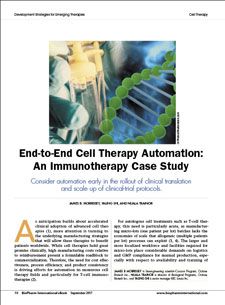
- BioPharm International-09-15-2017
- Volume 2017 eBook
- Issue 2
End-to-End Cell Therapy Automation: An Immunotherapy Case Study
Consider automation early in the rollout of clinical translation and scale up of clinical-trial protocols.
As anticipation builds about accelerated clinical adoption of advanced cell therapies, more attention is turning to the underlying manufacturing strategies that will allow these therapies to benefit patients worldwide. While cell therapies hold great promise clinically, high manufacturing costs relative to reimbursement present a formidable roadblock to commercialization. Therefore, the need for cost effectiveness, process efficiency, and product consistency is driving efforts for automation in numerous cell therapy fields and particularly for T-cell immunotherapies.
Download the
.
Article Details
BioPharm International
eBook: Development Strategies for Emerging Therapies
Vol. 30
September 2017
Pages: 10–18
Citation
When referring to this article, please cite it as J. Morrissey, N. Trainor, and Y. Shi, "End-to-End Cell Therapy Automation: An Immunotherapy Case Study," BioPharm International Development Strategies for Emerging Therapies eBook (September 2017).
Articles in this issue
over 8 years ago
Patenting Prospects for Cell-Based Therapiesover 8 years ago
Harvest of Human Mesenchymal Stem Cells from Microcarriersover 8 years ago
Optimizing a Unique Cancer Vaccine for Intradermal Deliveryover 8 years ago
Accelerating Genetic Medicine R&D Using Microfluidicsover 8 years ago
Overcoming Hurdles in Emerging Therapy DevelopmentNewsletter
Stay at the forefront of biopharmaceutical innovation—subscribe to BioPharm International for expert insights on drug development, manufacturing, compliance, and more.





